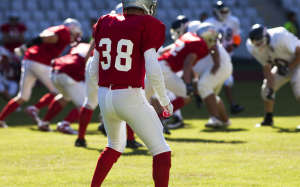 There has been increased attention in the media about the prevalence of concussions in professional sports. But the prevalence of concussions for college athletes should not be ignored.
There has been increased attention in the media about the prevalence of concussions in professional sports. But the prevalence of concussions for college athletes should not be ignored.
An NCAA study revealed that college athletes experience about 10,560 sports-related concussions each year. In fact, the Sports Concussion Institute reports that 36% of college athletes have experienced multiple concussions.
Concussions in college students are particularly concerning because the brain continues to develop until about age 25. Damaging the brain at a young age can have devastating consequences. Head injuries like concussions can negatively impact the development of skills like advanced problem-solving, decision-making, reasoning, and social consciousness.
Fortunately, if you experience cognitive symptoms after a sports-related concussion, a neuropsychologist can help.
When to See a Neuropsychologist
A concussion can occur after you experience any kind of hit to the head. The college sports with the most reported concussions are men’s football, women’s soccer, women’s and men’s basketball, and men’s wrestling. However, concussions can happen in nearly any collegiate sport.
There are two types of concussions. In one, the brain rotates from side to side, putting strain on brain tissues. In another, the brain hits both sides of the inner skull.
When you first get a concussion, you might not know you have one. In fact, athletes lose consciousness in fewer than 10% of sports concussions.
You may not notice concussion symptoms until hours or days later. Symptoms could include:
- Headaches
- Nausea
- Sensitivity to light
- Fatigue and problems sleeping
- Difficulty concentrating and remembering
- Mood changes
- Dizziness
- Confusion and slowed thinking
With mild concussions, you can relieve symptoms by resting from mental and physical exertion. A medical professional can perform a brain scan to determine the severity of your concussion. He or she can provide medical treatment and determine when it’s safe to return to work, school, and your sport.
However, in some cases, concussion symptoms can continue for weeks or months. Continuing symptoms could indicate significant brain damage. If you continue to see concussion symptoms, it’s important to visit a neuropsychologist for extensive treatment.
It’s also important to see a neuropsychologist if you’ve had multiple concussions. The more concussions you’ve had, the greater your risk for long-term complications.
What to Expect From a Neuropsychological Evaluation
When you first visit a neuropsychologist, he or she conducts an evaluation. The evaluation helps him or her understand how the concussion has affected your brain function and how severe your symptoms are.
The evaluation will include written or computerized tests that measure things like:
- Problem-solving skills
- Memory
- Concentration
- Reaction time
- Emotional state
The neuropsychologist uses the test results to determine your cognitive functioning and to decide on a treatment plan.
What To Expect From Neuropsychological Treatment
Fortunately, it is possible to recover from a severe concussion. Your neuropsychologist can teach you about concussion recovery and what to expect. He or she can help you distinguish between which symptoms are normal and which may be a concern.
Using the results of the neuropsychological evaluation, your neuropsychologist will create a customized treatment plan for you. The treatment plan might include the opportunity to develop and relearn cognitive skills. You can do this by participating in written or computerized training programs. Your neuropsychologist might also prescribe therapy or medication to treat your concussion symptoms.
Your neuropsychologist can help determine when it’s safe for you to return to school or work. Returning to school or work too early can put pressure on your brain that can slow your recovery.
Your neuropsychologist can also determine when it’s safe for you to return to your sport. Returning to play too early delays your recovery, and it also puts you at risk for serious injury. If you get another concussion before the old one heals, you can experience brain swelling. Brain swelling can be extremely serious and even fatal. Your neuropsychologist will continue to evaluate your cognitive function over time to make sure your brain is healing.
The amount of time it takes you to recover from your concussion depends on the severity of your concussion and how many concussions you’ve had in the past. It might also take longer to recover if you’ve had any previous problems with headaches or psychiatric disorders.
Your neuropsychologist can instruct you on how to prevent concussions in the future. Unfortunately, if you’ve already had a concussion, you’re about twice as likely to have another concussion. If you’ve had two concussions, you’re up to four times more likely to get a third concussion. It’s important to seek treatment now so you can continue to play your sport for many years to come.
If you’ve experienced a serious concussion in a college sport, set an appointment with a neuropsychologist right away. NeuroHealth Arlington Heights has helped many college students recover from concussions. Call NeuroHealth Arlington Heights today for an appointment.
